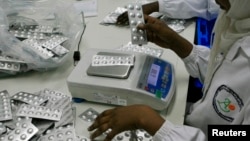GABARONE, BOTSWANA —
Providing Africans with affordable health care could be realized if pharmaceutical products were produced on the African continent. The continent faces many challenges before it will be able produce its own medicines.
African and Chinese delegations came together this week at the Roundtable on China-Africa Health Cooperation to discuss how Africa can start producing health care products on the continent. This could help African countries provide their citizens with a stable supply of quality medicines.
Feng Zhao of the African Development Bank said that producing locally could bring many benefits for the continent. "If you look at the pharmaceutical sector now, the size is very small compared to the global overall size. Africa is now less than 1 percent of the global share," noted Zhao. "It has a great potential to grow, the average growth rate is expected to be more than 10 percent."
The sector would also create high quality jobs and bring more technology to the continent.
Africa suffers frequent bouts of many preventable diseases, such as malaria and tuberculosis. But the medicines to treat these diseases are imported from outside the continent. And the cost of those imports weighs heavily on the health care budgets of many African countries.
But producing health care products in Africa comes with many challenges, said Janet Byaruhanga of the African Union Health Office. “Our health systems are not adequate enough to address some of the challenges that the continent is facing. That includes human resources for health, that includes the facilities in terms of hospitals, clinics, laboratories and all of those things. Then we also have issues around low funding because the health sector is considered more of a social sector," Byaruhanga stated. "It does not get enough funding, both from the government or even the donors.”
Although China has much experience in producing its own pharmaceutical products, the country still faces a lot of negative perception towards their medicines, as the World Health Organization hasn't approved most of them yet.
Dr. Ray Yip, who directs the Chinese branch of the Bill and Melinda Gates Foundation, said it will probably take 20 to 30 years before Africa produces high quality health products, as the industry is in its initial stages.
"Many countries, in early days, they are going for low cost and their quality doesn’t always meet the global standard. Then gradually they move up the value chain," Yip explained. "And they start producing better products.”
For Africa to become a major player in the pharmaceutical sector, it has to start partnerships with companies outside the continent that have the technology, the people and the intellectual property.
The African Union has started with the development of a Pharmaceutical Manufacturing Plan for Africa to promote private-public partnerships to push the pharmaceutical sector.
African and Chinese delegations came together this week at the Roundtable on China-Africa Health Cooperation to discuss how Africa can start producing health care products on the continent. This could help African countries provide their citizens with a stable supply of quality medicines.
Feng Zhao of the African Development Bank said that producing locally could bring many benefits for the continent. "If you look at the pharmaceutical sector now, the size is very small compared to the global overall size. Africa is now less than 1 percent of the global share," noted Zhao. "It has a great potential to grow, the average growth rate is expected to be more than 10 percent."
The sector would also create high quality jobs and bring more technology to the continent.
Africa suffers frequent bouts of many preventable diseases, such as malaria and tuberculosis. But the medicines to treat these diseases are imported from outside the continent. And the cost of those imports weighs heavily on the health care budgets of many African countries.
But producing health care products in Africa comes with many challenges, said Janet Byaruhanga of the African Union Health Office. “Our health systems are not adequate enough to address some of the challenges that the continent is facing. That includes human resources for health, that includes the facilities in terms of hospitals, clinics, laboratories and all of those things. Then we also have issues around low funding because the health sector is considered more of a social sector," Byaruhanga stated. "It does not get enough funding, both from the government or even the donors.”
Although China has much experience in producing its own pharmaceutical products, the country still faces a lot of negative perception towards their medicines, as the World Health Organization hasn't approved most of them yet.
Dr. Ray Yip, who directs the Chinese branch of the Bill and Melinda Gates Foundation, said it will probably take 20 to 30 years before Africa produces high quality health products, as the industry is in its initial stages.
"Many countries, in early days, they are going for low cost and their quality doesn’t always meet the global standard. Then gradually they move up the value chain," Yip explained. "And they start producing better products.”
For Africa to become a major player in the pharmaceutical sector, it has to start partnerships with companies outside the continent that have the technology, the people and the intellectual property.
The African Union has started with the development of a Pharmaceutical Manufacturing Plan for Africa to promote private-public partnerships to push the pharmaceutical sector.
